![Indira Gandhi Krishi Vishwavidyalaya - [IGKV]](https://image-static.collegedunia.com/public/college_data/images/appImage/1496032884dddddddddddddddd.jpg?h=240&w=1000&mode=crop)
Indira Gandhi Krishi Vishwavidyalaya - [IGKV], Raipur - Course & Fees Details
IGKV Fees & Eligibility
| Course | Fees | Eligibility | Action |
|---|---|---|---|
M.Sc 18 Courses | ₹14,669 - 57,473 (1st Year Fees) | Graduation | |
B.Tech 1 Course | ₹20,218 (1st Year Fees) | 10+2 | |
Ph.D 23 Courses | ₹22,165 - 30,164 (1st Year Fees) | Post Graduation | |
MBA 1 Course | ₹57,780 (1st Year Fees) | Graduation | |
B.Sc 1 Course | ₹14,710 (1st Year Fees) | 10+2 with 50% + CG PAT |
Do you think the Course details are wrong ? Report Here
Courses Offered By IGKV 2024
Select Degree and Streams to See Course Fees and Admission Details.
Eligibility:
Eligibility:
Eligibility:
Eligibility:
Do you think the fees are wrong ? Report Here
Eligibility:
Eligibility:
Course Finder
Search from 20K+ Courses and 35+ Streams
Popular Streams:
Why To Join IGKV - Reviews & Rating
Most Popular Tags

Likes
- Teachers are very supportive and experienced
Dislikes
- Examination pattern I didn't understand
Fees and Financial Aid:
Tution fee was near 7000 -8000 rs and examination fee was 1000rs semester wise ,and hostel fee per semester was 1800, Scholarship also provided to students for obc 19000 and sc and st it was near 22000 .
Likes
- The college building is good. Classrooms are spacious and arranged.
- We have inside college bus service for student to go to college from their respective hostel
Dislikes
- College neither provide nor assist in on campus placement.
- The university do not have any official student union neither they conduct student union election like other universities (DU,RU)
Fees and Financial Aid:
We need to pay around 24000 per year as a fee which include all the fees of the institution. We need to pay around 10000 per semester as a fee and about 1500 per semester as examination fee. Hostel is very much affordable it cost about 1618 for a semester. Here students also get scholarship NTS scholarship - 3000 per month State scholarship - for st 41000 per year for sc 39000 per year OBC - 26000 per year. In IGKV we have corporate mess in which student either give tender or run themselves the mess fee is about 1900-2000 per month

Likes
- Teacher are reallly verrry good they support you every time
Dislikes
- College is verrry verry strict some it feel like it is school
Fees and Financial Aid:
I am amey singh doing bsc ag from bhartiya college of agriculture which is situated in Durg. I take admission in 2022 in college. Teacher are verrryyy good in college and verry friend and helpful in nature.

Likes
- The atmosphere is very nice peoples are very good
- Surrounding is very neat and clean and rules and regulations are followed
Fees and Financial Aid:
Year wise I pay 70000 rupees fees Where, Tution fee 20000 Registeration fee 50000 Fees will be paid at starting of semester Fees are fixed for all categories Scholarship I got is 17000 yearly and scholarship of ST SC is more as compared to OBC
Likes
- The campus is very beautiful and huge which involves a lot of field of the college facilitating the students to learn more practically.
- The social interaction is not so good but mediocre and I like being in normal surrounding so it's good for the people like me.
Dislikes
- The timing is not so good for hostels. In hostels the gate is closed at 10pm.
- In college some faculty interaction can make you feel tired and frustrated as every colleges do.
Fees and Financial Aid:
The year wise fees I pay is about 18 thousand rs. The registration fee, caution fees, tuition fees, admission fees, development fees, lab fees and the other charges are included in the 18 thousand. If the students has applied in self financed then it will cost him/her about 1 lakh 10 thousand for college fees hostel charges excluded. This college will provide you Post matric scholarship which provides about 33 thousand to ST category students.
Likes
- Campus is nice and big has lots of facilities related to the course
- Lots of visual representations of the topic
Dislikes
- Overly crowded classes makes it hard to concentrate
- Better advancement in the campus for alot of things
Fees and Financial Aid:
For normally selected people feel is - 10500 For the self-financed seat, it is - 50000 For sc and st scholarship is around - 32000 And obc is - 15000 female Per semester I have to pay 50000 total 8 semesters which makes it - 450000 For a regular selected student whole amount comes upto - 50800 for 8 semesters
Likes
- All teachers are very kind and dedicated
Dislikes
- Buildings are old and somewhere it need amendments.
Fees and Financial Aid:
Postmatric scholarship Around 25000 give per annum scholarship on the basis of their category and also merit scholarship provided for students. The complete cost of education around 56000 during whole course

Likes
- I LIKES THE FACULTIES THEY ARE EXPERIENCED AND HIGH TEACHING QUALITIES
- THE UNIVERSITY OFFER A WIDE RANGE OF ACADEMIC PROGRAM
Dislikes
- CANTEEN FACILITIES NEED TO BE IMPROVE AND QUALITIES OF FOOD
- TRANSPORT FACILTIES AS NOT MUCH FOR THE NON HOSTELRS
Fees and Financial Aid:
THERE IS A BASIC FEE STRUCTURE WHICH CAN AFFORD MOSTLY OF THE STUDENTS WHO ARE WANT TO STUDY IN THIS UNIVERSITY , THERE IS ALSO A SCHOLARSHIPS FOR THE STUDENTS ON THE BASIS OF MERITS AND THERE CATEGORIES AND HELPS THE STUDENTS TOWARDS A HEALTHY EMPLOYMENT OPPORTUNITIES

Likes
- I like the facilities of my college..I like my library because all books are available according to subject...
- And all festival is celebrated in my college...
Dislikes
- I dont like that that I have to study 11 subjects in 1 semester
- Some facilities is not good in my college....
Fees and Financial Aid:
My fees is 10,000 per semester and my total course is 4th year i.e 8 sem ...as I am OBC category I had applied for scholarship and I got 14,000 in 1 year.. And i am satisfied with it ...i 'am happy that i 'am studying in government college....

Likes
- Training programs are held every month through which the students get knowledge and skills
- The campus is quite big and beautiful all the departments are beautifully managed by the faculty
Dislikes
- The departments are far away from each other so when the student had to go to one department to another department they have to walk more
Fees and Financial Aid:
For the Government colleges, the fee is about 600 per semester which makes 1200 years and when we talk about the private colleges the fee is 30000 per semester which makes 60000 years. The scholarship is given to reserved candidates who belong to ST-SC and OBC. OBC candidates get rs 12000 a year and when we talk about St and SC candidates they get most probably 15000 to 18000 a year. There are a lot more jobs in the agriculture field, you can give the exam like IBPS AFO which is the banking exam. RAEO and RHEO RURAL AGRICULTURE EXTENSION OFFICER AND RURAL HORTICULTURE EXTENSION OFFICER. ADO AGRICULTURE DEVELOPMENT OFFICER. HDO horticulture development officer.
Do you think the data is wrong ? Report Here
IGKV Latest News
IGKV Result 2024 (Released): Check UG, PG, Revaluation Result, Time Table @igau.edu.in


IGKV CET 2020 Cut Off List has been Announced for UG Courses; Check Details Here


Discover More Colleges



![Indira Gandhi Krishi Vishwavidyalaya - [IGKV]](https://image-static.collegedunia.com/public/college_data/images/logos/1495783879raoLogo.png?h=71.17&w=71.17&mode=crop)

![Shaheed Gundadhur College of Agriculture and Research - [SGCARS]](https://image-static.collegedunia.com/public/college_data/images/appImage/6719_SGCA.jpg?h=111.44&w=263&mode=crop)





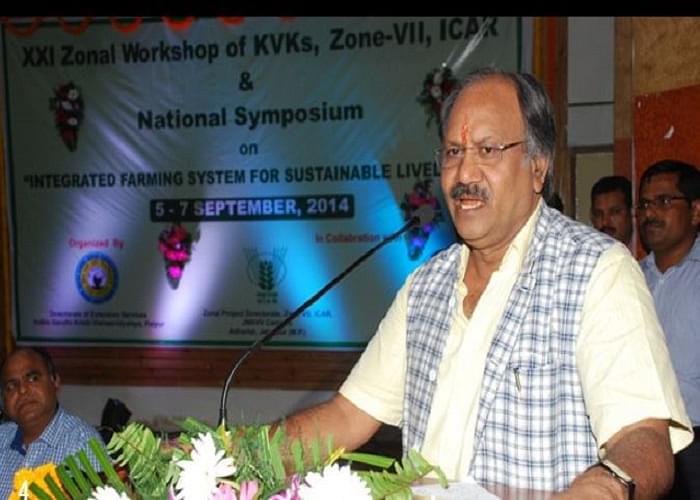
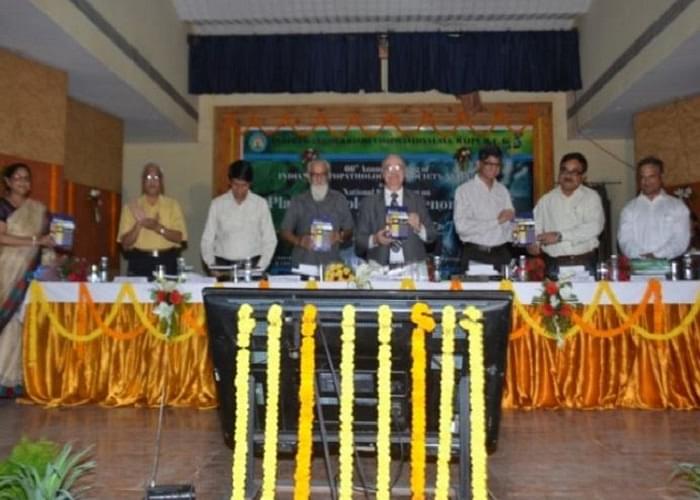
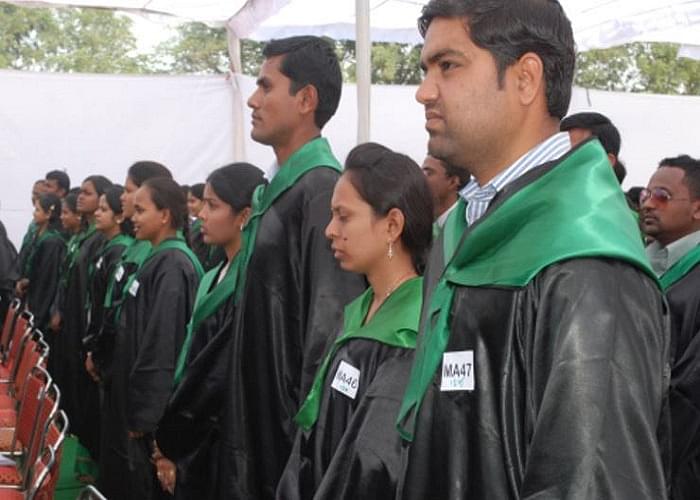
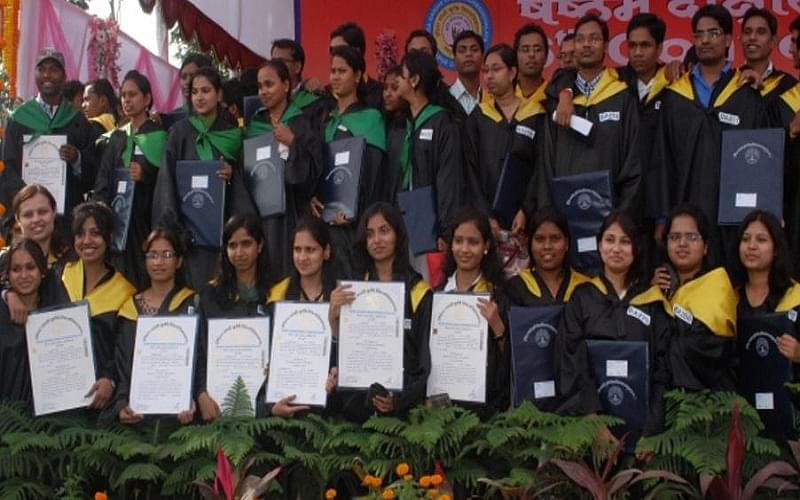

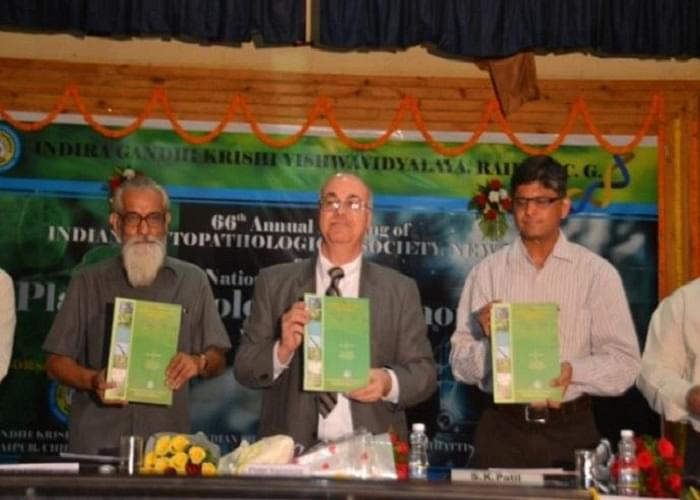


![Shaheed Gundadhur College of Agriculture and Research - [SGCARS]](https://image-static.collegedunia.com/public/college_data/images/logos/1422291820Captureddsvsd.jpg?h=72&w=72&mode=crop)
![Rajmata Vijayaraje Scindia Krishi Vishwa Vidyalaya - [RVSKVV]](https://image-static.collegedunia.com/public/college_data/images/logos/1415016954LOGO-RVSKVV.jpg?h=72&w=72&mode=crop)


![Central Agricultural University - [CAU]](https://image-static.collegedunia.com/public/college_data/images/logos/1433933037jp.jpg?h=72&w=72&mode=crop)
![College of Dairy and Food Science Technology - [CDFST]](https://image-static.collegedunia.com/public/college_data/images/logos/1496235161logo.png?h=72&w=72&mode=crop)

![Jawaharlal Nehru Krishi Vishwa Vidyalaya - [JNKVV]](https://image-static.collegedunia.com/public/college_data/images/logos/1489052046JNKVVImage.jpg?h=72&w=72&mode=crop)
![Chhattisgarh Kamdhenu Vishwavidyalaya - [CGKV]](https://image-static.collegedunia.com/public/college_data/images/logos/1460701660download.jpg?h=72&w=72&mode=crop)
![Shri Rawatpura Sarkar University - [SRU]](https://image-static.collegedunia.com/public/college_data/images/logos/1557378316logo.png?h=72&w=72&mode=crop)

![Banda University of Agriculture and Technology - [BUAT]](https://image-static.collegedunia.com/public/college_data/images/logos/1500035121Logo.jpg?h=72&w=72&mode=crop)
![Birsa Agricultural University - [BAU]](https://image-static.collegedunia.com/public/college_data/images/logos/1494316534logo.png?h=72&w=72&mode=crop)
![Bihar Agricultural University - [BAU] Sabour](https://image-static.collegedunia.com/public/college_data/images/logos/1437546994bihar university.jpg?h=72&w=72&mode=crop)





Comments